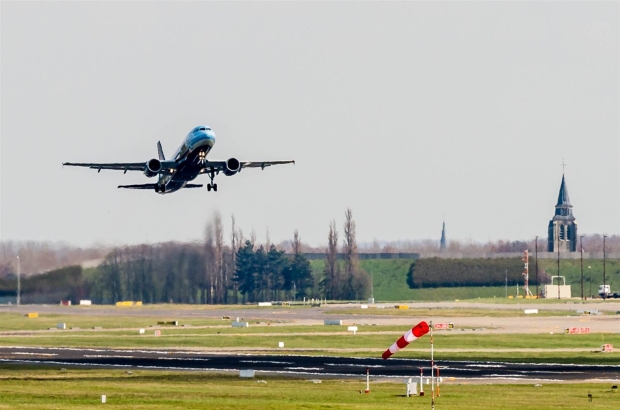- Daily & Weekly newsletters
- Buy & download The Bulletin
- Comment on our articles
'The sky has limits': Protest against Brussels Airport expansion
More than 500 protestors marched to Brussels Airport on Sunday to criticise plans for further expansion in light of environmental and public health concerns.
Organised by Bond Beter Leefmilieu and neighbourhood associations, the action also featured delegations from Brussels, all united in protest against the airport’s plans for further expansion.
Brussels Airport's environmental permit expires in mid-July 2024 and expansion is planned to follow.
Protestors are asking Flemish environment minister Zuhal Demir (N-VA) and federal mobility minister Georges Gilkinet (Ecolo) to "put public health and the environment above the profits of the airport's private shareholders".
Four demands were central: a ban on night flights, a cap of 220,000 aircraft movements a year, the introduction of a low-emission air zone and a limit on overflights.
The demonstrators carried banners depicting these four demands and banners with slogans such as: "We're lying awake!" and "The sky has limits".
“That so many residents from different municipalities were present shows that the impact of the airport extends beyond just the surrounding municipalities,” said Jasper Wouters of Bond Beter Leefmilieu (BBL).
The mayor of Jette, Claire Vandevivere, and mayor of Woluwe-Saint-Pierre, Benoît Cerexhe (Les Engagés), were also present, as was an Ecolo-Groen delegation from Jette. The mayors say that the residents of their municipalities are suffering from Brussels Airport air traffic.
“About 40% of flights fly over Woluwe-Saint-Pierre, which causes a lot of noise pollution,” Cerexhe said. “We can't go on like this.”
Brussels Airport said it wanted to become more sustainable, according to its written response to the demonstration.
“On this approach and vision of the future, the airport is happy to enter into dialogue with local residents,” the statement said. “The airport does want to be able to grow along with the economy.”
According to Brussels Airport, the number of aircraft movements will grow slowly in relation to the number of passengers, as aircraft become bigger and more environmentally friendly.
Brussels Airport said it was also encouraging airlines to renew their fleets, adding: “The oldest aircraft cost companies up to 20 times more than the newest ones.”
Spokesperson Ihsane Chioua Lekhli said the airport also has a key economic function in Belgium, with 14,000 jobs depending either directly or indirectly on night flights alone.
“We specialise in pharma, in vaccines, which have to be delivered quickly,” Chioua Lekhli said. “Banning those night flights would have a major socio-economic impact. For many companies, from West Flanders to Limburg, international transport is essential for their export activity.”
Brussels Airport also refuted the figures from BBL, including that the airport emits more nitrogen than all companies in the port of Antwerp combined.
“That is manifestly incorrect. It is not clear what BBL bases its claim on,” the airport’s statement reads. “The figures we consulted in the Flemish Environment Agency's database show the opposite – which does not mean that we are not further committed to this issue.”
But the noise was of paramount concern for many who attended the protest, along with its ripple effects.
“The problem is that we don't sleep well,” one protestor told reporters. “We sleep badly, but also when we're on the terrace in summer, we can't hear each other talk. You can practically see the wheels of these planes.”
In an address to protestors, Bertrand Waucquez of the Belgian Union against Air Pollution emphasised that “a good balance between the economy, ecology, employment and health” was needed.



















